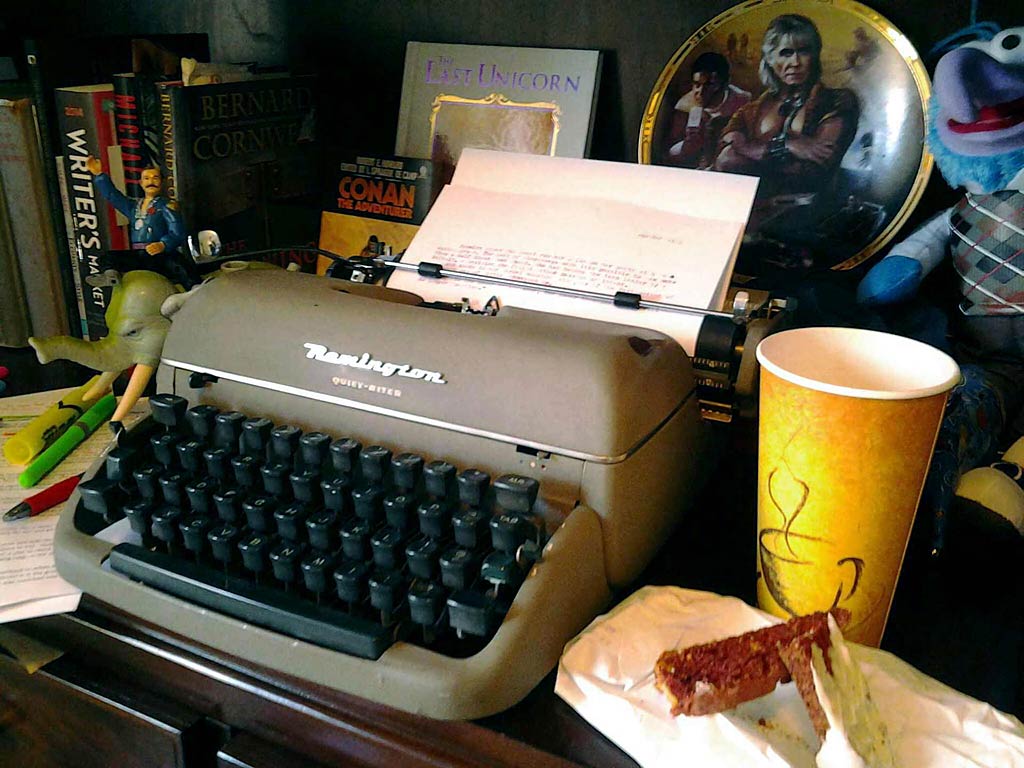If you’ve bee following this site for a while, you probably already know the difference between a “loose” and “tight” comic script.
A tight script can essentially touch on any elements in a comic: camera direction, panel positioning, the four essential panel elements, borders, colors, etc…
Whereas, in contrast, a loose script, is a much briefer approach, that leaves more of those decisions to the artist.
A lot of writers new to comics like to work in “loose script mode”. This is fine, actually, in many ways it’s the preferred place to start… but the problem is when a writer says “I’m writing a loose script” and really means “I’m being a lazy writer”.
When you don’t put enough information in a panel description for an artist, I call it a “Thin Panel description.”
Don’t confuse a loose script with delivering Thin Panel Descriptions.
Let me give you an example off the top of my head:
—–
Panel 4:
Bob runs down the hall screaming.
—–
I want you to take a second, and visualize that panel. I’ve actually seen plenty of panel descriptions just like this land on my desk. Really, take a second, pretend you’re the artist and think of what you’d draw based on just this…
no cheating…
… ok, ready to continue?
Firstly, I won’t even get into verb choice and diction of panel descriptions. (That’s important, but I go over that in the Writer’s Guide.)
So let me jump into writing a more complete panel description.
Panel 4:
Bob the android runs down the hall screaming. The servos in his limbs no longer work properly forcing his legs and arms stiff. His eyes spit sparks and his polymer teeth clench together. Unable to see where he’s going, Bob runs against the wall, really, sliding as much as running. Blood splatters from the four people he killed a few minutes ago saturate his pants.
Big black arrows painted on the wall point in the opposite direction in the way Bob’s headed.
Bet you didn’t see that one coming. And I bet you can visualize that one a little bit better than the first try.
Let’s do another one.
Panel 4:
Bob, the greatest opera singer in the galactic imperium, runs down the hall screaming. His right hand reaches triumphantly towards the ceiling as he holds the greatest, purest, loudest b-flat he’s ever shouted before. His face flushes beet red, his brow leaks numerous beads of sweat, and his pointed eight inch long alien ears stand erect under his physical strain.
Elated by his effort, Bob rushes along completely ignorant to his Renaissance period female gown catching on a broken nail jutting out of the wall in the background. Half the gown already unraveling around his legs, revealing scrawny, hairy yellow legs, and commando style shin high military boots.
Now of course, context makes all the difference in the world. If we had already established Bob was an android, or an opera singer, we wouldn’t have to mention that in every panel. But the question arises, how much context is required for the artist to understand your panel?
The previous frame? The previous three frames? The previous page? The previous five pages?
The more you rely on context, the more work you’re asking the artist to do… and in reality, the more likely he is to flub it up.
Hopefully, my two off the cuff samples show you how details can add weight to the panel and give the artist material to well… actually, illustrate.
If you just say “Bob is running and screaming”, you’re really not writing visually, and comics are all about writing visually.
Notice by the way, how neither of the two panels I wrote in more detail (in 30 seconds off the top of my head) have camera direction, address layout, panel placement, lighting or any of the “tighter” stuff.
Significant detail and still looser than a muumuu on Gisele Bündchen.
If really want to run loose scripts, go check out Effective Loose Scripting at StoryToScript.com
Last thing… One of the most important things you always want to capture at a minimal level, is the character’s emotional state (if a character is in the panel). Emotion completely changes the way we do, well, just about anything.
Screaming with anger, screaming with joy. All the difference in the world.▪
About the Author —
Nick Macari is a full-time freelance story consultant, developmental editor and writer, working primarily in the independent gaming and comic markets. His first published comic appeared on shelves via Diamond in the late 90’s. Today you can find his comic work on comixology, amazon and in select stores around the U.S. Visit NickMacari.com for social media contacts and news on his latest releases.

One thought on “Loose Vs. Thin”
Comments are closed.